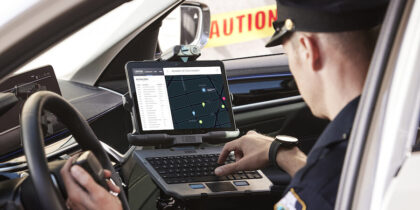Mobile government refers to the interaction between citizens and government services via mobile devices. In a perfect world, citizens would be able to access important government data at a moment’s notice. However, this is not necessarily the case. Today, many government services are not easily accessible and valuable information often goes unnoticed. Organizing effective communication requires an unrealistic commitment of resources for authorities. Fortunately, nearly everyone has a smartphone or tablet nowadays. With the right mobile platforms, governments can efficiently share data while reducing the financial burden on taxpayers.
A Connected Government Can Address the Mobile Citizen
One of the greatest benefits of mobile government is the ability to reach a large audience quickly, which isn’t always possible using traditional printed media or even television. Citizens are always on the move and often don’t have time to stop and read. Through mobile devices, fully connected governments can provide a wide range of services without taking valuable time out of someone’s day. Safety alerts can be sent to devices in real time, and forms can be filed while at home, in the office or while commuting. Communication isn’t just restricted to applications; most mobile devices already receive weather and AMBER alerts over an emergency broadcast system. Every citizen can benefit from mobile services because time and space limitations disappear.
Additionally, private developers have made utilities like alternative fuel locators and radiation emergency systems, which are available for a nominal fee. Premade applications save authorities the extensive time and money involved in development. Equally helpful, a market already exists for public safety software; just search any principal app store.
Inversely, mobile devices can give governments an impressive amount of data on their citizens, which can be used to improve operations and create new services. Every citizen actively exchanges data with peers and institutions, whether it’s through active input into a program or app data collected during use. These exchanges converge into valuable analytics that can shape the way government services are rendered. Analysts at Gartner determined that more than 50 percent of citizens will want mobile access to government services by 2017, creating a large pool from which data can be extracted.
Bureau-to-Bureau Sharing Boosts Efficiency
Mobile technology can also benefit the government’s bottom line. According to a study by Frost & Sullivan, 66 percent of respondents (IT decision makers in the U.S.) say that reducing costs is a top driver for IT investments. Consider the reduction in paper costs and time commitment for information management. When employees can communicate wirelessly, there is no need for paper memos or directives, and file cabinets virtually become a thing of the past.
Further, mobile government improves the working experience and productivity of internal personnel. Because all data can be accessed in the field, users don’t waste time retrieving and exchanging documents back at the office. Public works professionals can view work orders, blueprints and geological reports all while on the job site. A survey of IT professionals revealed that the most significant benefits of tablets are increased productivity, cost reduction and accelerated decision making. Given that 52 percent of government employees use tablets in the workplace, mobile-first adoption should be a critical undertaking.
Secure Devices Make Secure Borders
The rapid adoption of mobility in government environments raises concerns about privacy and security. Vital data is at risk for cyberattacks and exposure, especially when cybercriminals and intelligence agencies are intensifying operations against mobile platforms. A hack could endanger national security or expose confidential citizen information. Governments need to build trusted solutions that allow for mobility while also ensuring that data is kept in a safe place.
Samsung’s solution for safety concerns is Samsung KNOX, which protects mobile devices with multiple layers of protection. KNOX, along with solutions like the Fixmo Enterprise Mobility Platform, secures data with containerization, encrypts information in transit and requires multifactor authentication for information access. Samsung has also partnered with CellTrust to integrate COMMAND, a mobile solution that protects messaging systems and archives content for security analysis. By monitoring anomalous behavior over their networks, governments can prevent security threats before they happen.
Tablets Are Transforming How Government Works from Samsung Business USA
Want to learn more about how mobile devices boost productivity in government? Visit our Government page for additional resources.
![Mobile Government: How Mobile Devices Are Pervading Government Environments [INFOGRAPHIC]](https://s47295.pcdn.co/wp-content/uploads/2018/01/govt-tabs-875x404.png)






